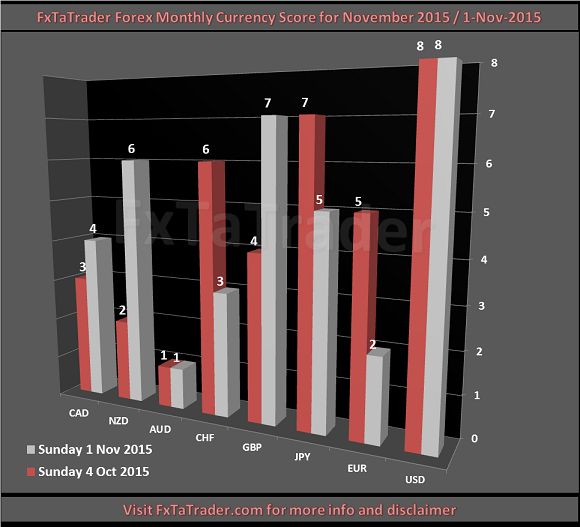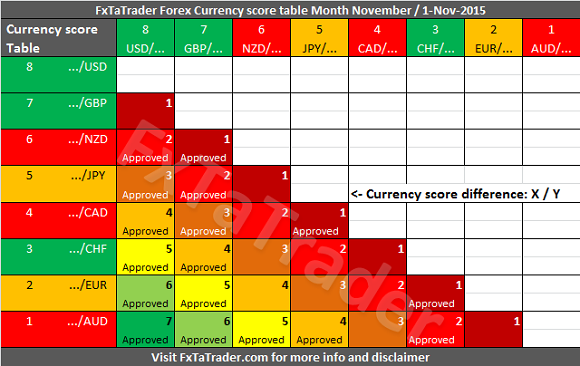The Currency Score analysis is one of the parameters used for the Ranking and Rating list, which was published earlier. It is recommended to read the page Currency score explained and Models in practice for a better understanding of the article. This article will provide my analysis on the 8 major currencies based on the technical analysis charts using the MACD and Ichimoku indicator on 3 time frames, the monthly, weekly and daily. The result of the technical analysis are the 2 screenshots in this article showing the Currency Score and the Currency Score Difference.
Last 12 months currency classification
The last 12 months currency classification from a longer term perspective are provided for reference purposes. See for more information the article: Monthly Currency Score for October, where the charts are available. There are no changes since June and the currencies are classified for the coming months as follows:
- Strong: CHF / GBP / USD. The preferred range is from 6 to 8.
- Average: EUR / JPY. The preferred range is from 4 to 5.
- Weak: AUD / CAD / NZD. The preferred range is from 1 to 3.
Currency Score for November 2015
For analyzing the best pairs to trade the last 3 months currency classification is the first issue. When looking at the most recent score that is used for the coming period, we can see in the screenshot below the deviations and we can come to certain conclusions. These are explained below the screenshot.

In essence, it comes down to the 3 following lines of text:
- A strong currency can be traded long against all the other currencies except on a pullback(deviation); then it seems best to trade it only against a weak currency.
- A weak currency can be traded short against all the other currencies except on a pullback(deviation); then it seems best to trade it only against a strong currency.
- When an average currency is outside the range(deviation), it is best not to trade it against it's own currencies in the average range, and the currencies in the range it is at.
Because the text above is abstract, you can read here below a more detailed description.
Strong currencies
There is a deviation for the CHF with a score of 3. This is a strong currency and it should have by preference a score from 6 to 8.
- There is a decrease of momentum for the CHF, which is getting weaker.
- The CHF has a score at the moment of a weak currency and it seems best for trading, depending on the opportunities coming around, going long against the weak currencies.
There are no other deviations, meaning that the other strong currencies, GBP and USD, seem best for trading, depending on the opportunities coming around in the following ways:
- going long against the average currencies
- going long against the weak currencies
Average currencies
There is a deviation for the EUR with a score of 2. This is an average currency, and it should have by preference a score from 4 to 5.
- There is a decrease of momentum for the EUR, which is getting weaker.
- The EUR has a score at the moment of a weak currency and it seems best to for trading, depending on the opportunities coming around, going short against the strong currencies.
There are no other deviations meaning that the other average currency, the JPY, seems best for trading, depending on the opportunities coming around, in the following ways:
- going short against the strong currencies
- going long against the weak currencies
Weak currencies
There is a deviation for the NZD with a score of 6. This is a weak currency and it should have by preference a score from 1 to 3.
- There is a decrease of downward momentum for the NZD, which is getting stronger.
- The NZD has a score at the moment of a strong currency and it seems best for trading, depending on the opportunities coming around, going short against the strong currencies.
There is a deviation for the CAD with a score of 4. This is a weak currency and it should have by preference a score from 1 to 3.
- There is a decrease of downward momentum for the CAD, which is getting stronger.
- The CAD has a score at the moment of an average currency and it seems best for trading, depending on the opportunities coming around, going short against the strong currencies.
There are no other deviations meaning that the other average currency, the AUD, seems best for trading, depending on the opportunities coming around, in the following ways:
- going short against the strong currencies
- going short against the average currencies
Summary:
- The weak currencies against the EUR are most probably ranging and there are most probably no opportunities in the Top 10 of this month "Ranking and Rating list."
- The CHF, NZD and CAD may offer a good opportunity to step in. However, it is important to determine if the specific pair is indeed having a pullback. For that reason, it is good to see the momentum returning in that pair, check the "Ranking and Rating list." If there is momentum, then check also the"Currency score difference" table.
- All the other pairs may be in a trend when complying to the "Currency score difference" table, which can be seen here below. There are most probably opportunities in the Top 10 of this week "Ranking and Rating list."
- By using the (1)"Ranking and Rating list" with the (2)above Monthly Currency Score analysis and the (3)"Currency score difference" table with the (4)Bollinger Band® analysis provided here below, a good foundation is provided for looking at the Monthly and Weekly Technical analysis chart of a specific pair.
Currency Score difference for November 2015
According to the Ranking and Rating list already published this month, the following pair combinations look interesting:
When looking at the Currency Score Table here below for this month, we can see the currency score differences. The interesting pairs should have by preference a score difference of 4 or higher when they are similarly classified. Or the better classified pair should have a higher score than the counterpart. All the pairs mentioned above comply for trading in the coming month. The Currencies are colored Green, Orange and Red resp. by the classification they have. This way it is easier to see what currencies should have a certain score difference.

The technical analysis is the most important issue to consider before taking positions. The Weekly Chart is analyzed. I prefer the Bollinger Band for defining where a pair is in the chart. Once a pair is outside a Bollinger Band, it is in a strong trend, which can cause a strong pullback. Although this may be a good opportunity for other analysts, I avoid taking positions because of the possible unexpected strong pullback. Positions are only opened inside the Bollinger Band, and this may be at the start of a possible trend or on a good pullback in an existing trend.
- The GBP/AUD is in an uptrend and at the Bollinger Band.
- The EUR/GBP is in a downtrend and at the Bollinger Band.
- The AUD/USD is in a downtrend and within the Bollinger Band.
- The EUR/USD is in a downtrend and within the Bollinger Band.
When trading according to the FxTaTrader Strategy, some rules are in place. For more information, see the page on my blog FxTaTrader Strategy. Depending on the opportunities that may come up, the decision to trade a currency may become more obvious at that moment. If you would like to use this article, then mention the source by providing the URL FxTaTrader.com or the direct link to this article. Good luck in the coming month.
DISCLAIMER: The articles are my personal opinion, not recommendations, FX trading is risky and not suitable for everyone.The content is for educational purposes only and is aimed solely for the use by ‘experienced’ traders in the FOREX market as the contents are intended to be understood by professional users who are fully aware of the inherent risks in forex trading. The content is for 'Forex Trading Journal' purpose only. Nothing should be construed as recommendation to purchase any financial instruments.
